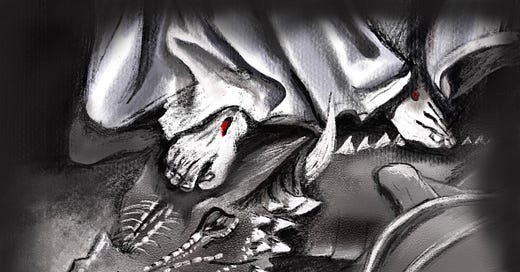by Julia Sternberg
Growing up, I didn’t really believe in demons. Or at least, I didn’t see the need to take them seriously. Of course, I knew of the many during Jesus’ time who were madly possessed, even by multiple demons. But in my mind, that was in the past. In my little corner of the world, demons only existed in horror films. Then I learned that there are still men who are in the business of exorcism today. I learned some things that still make my hair stand on end whenever I think of them. We live in an age of science and reason, an age where the supernatural is often scoffed at as make-believe, an age where mankind believes he has advanced far beyond such fairytales. Angels and demons only exist in cinema, and “God” is merely a thought experiment. None of it is real; it’s all for entertainment. Unlike the fairies of the Tinker Bell world, however, demons don’t cease to exist when we stop believing in them. They don’t want us to believe in them. We’re much easier to deceive if we remain ignorant. Back in Jesus’ time, there was a particular psalm that was commonly used by exorcists to cast out demons. That psalm was Psalm 91. You might recognize it from the Gospels of Matthew and Luke, when the devil references it (rather ironic, isn’t it?) as he tempts Jesus in the wilderness. The psalm has continued to be well-beloved by Christians in the centuries following Christ. According to an Orthodox priest by the name of Patrick Henry Reardon, it was the tradition of western Christians to recite this psalm every evening, while for Christians in the east, it was tradition to recite it at noon (p. 179). This was because of the references the psalm makes to these two times of day: “You shall not be afraid of the terror by night, nor of the arrow that flies by day, nor of the pestilence that walks in darkness, nor of the destruction that lays waste at noonday.” (v. 5-6) Reardon suggests that these two traditions are actually not all that different. He writes, “When Christians pray each day at noon, they observe that hour recalling the darkness that fell on the earth as the Savior hung on the Cross.” (p. 179). Both traditions have the same confession: regardless of when darkness comes, we who are in Christ have nothing to fear. Though we may hear the exultant shrieks of the demons when it seems that the light has been overcome, the children of God stand firm. The jubilation of the demons will not last long. Just as it was stripped away on that first Easter when the light of the world emerged from the grave, so any victory of theirs since only adds a nail to their own coffin. Their judgment will be severe on the Last Day, and it will be inescapable. Recall the promise made to Adam after the fall, that his offspring would one day crush the head of the serpent, but only after His own heel had been bruised. Psalm 91 echoes this promise, which is perhaps why it was used with such frequency during exorcisms. Verse thirteen reads, “You shall tread upon the lion and the cobra, the young lion and the serpent you shall trample underfoot.” The “you” hear we can clearly see to be our Lord Himself on that fateful Good Friday. And because we have been baptized into His death and resurrection, we too through Him have tread upon the powers of darkness. This is why we need not tremble in fear of the evil spirits that run rampant all around us! They can be no threat to us, for their defeat is already secured. We have but to speak the name of Jesus Christ and the demons shudder and flee. Though devils all the world should fill, All eager to devour us, We tremble not, we fear no ill; They shall not overpow’r us. This world’s prince may still Scowl fierce as he will, He can harm us none. He’s judged, the deed is done. One little word can fell him. (LSB 656) Reardon, Patrick Henry. Christ in the Psalms. Ancient Faith Publishing, 2000.




